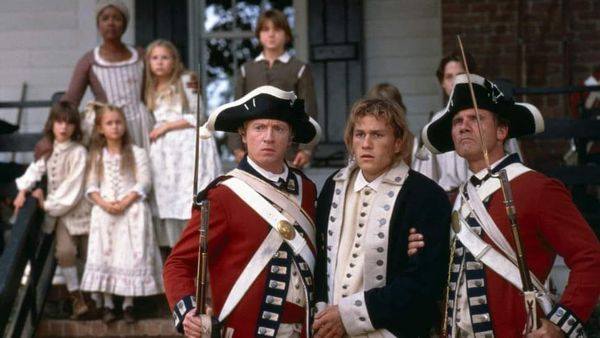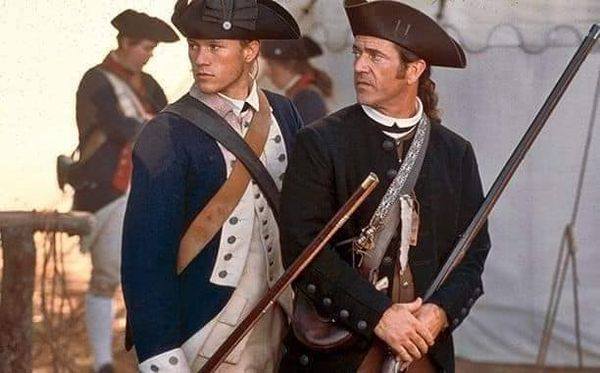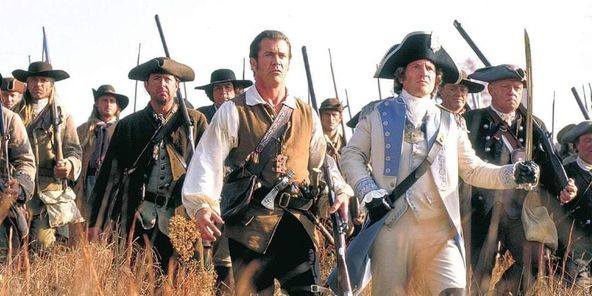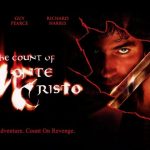The Patriot (2000)

The Patriot (2000) is a historical war film directed by Roland Emmerich, starring Mel Gibson as the lead character, Benjamin Martin. Set during the American Revolutionary War, the film is a sweeping epic that blends personal drama, intense battle scenes, and a strong sense of patriotism. It explores themes of family, sacrifice, and the struggle for freedom.
The story follows Benjamin Martin, a widowed father of seven children, who is a veteran of the French and Indian War. Now a pacifist, he is determined to avoid involvement in the ongoing conflict between the American colonies and the British Empire. However, his resolve is tested when the war reaches his doorstep. After his eldest son, Gabriel (Heath Ledger), joins the Continental Army against his wishes, Benjamin is drawn into the conflict when a brutal British officer, Colonel William Tavington (Jason Isaacs), kills one of his younger sons and burns down his home.
Driven by a desire for revenge and a newfound sense of duty, Benjamin joins the American Revolution, leading a militia group to fight against the British forces. The film depicts his transformation from a reluctant participant to a fierce and strategic leader, known as the “Ghost” for his guerrilla warfare tactics. As he fights for the independence of the American colonies, Benjamin also grapples with his own internal struggles, haunted by the violence of his past and the weight of his responsibilities as a father.
The Patriot is noted for its epic battle sequences, which are both brutal and visually stunning. The film vividly portrays the chaos and carnage of 18th-century warfare, with large-scale set pieces that emphasize the intensity and brutality of the conflict. The cinematography, by Caleb Deschanel, captures the lush landscapes of the South Carolina countryside, contrasting the beauty of the natural environment with the horrors of war.
Mel Gibson’s performance as Benjamin Martin is a key strength of the film. He brings a powerful emotional depth to the character, portraying him as a man torn between his desire to protect his family and his duty to fight for his country’s freedom. Gibson’s portrayal of Martin’s inner turmoil and his journey from pacifism to vengeance adds complexity to the character, making him a compelling and relatable protagonist.
Jason Isaacs delivers a memorable performance as Colonel Tavington, the film’s primary antagonist. Tavington is depicted as a ruthless and cold-blooded officer, embodying the cruelty and oppression of the British forces. Isaacs’ portrayal of Tavington provides a formidable counterpoint to Gibson’s Martin, heightening the tension and stakes of the narrative.

While The Patriot was praised for its performances, action sequences, and emotional depth, it also faced criticism for historical inaccuracies and its romanticized portrayal of the American Revolution. Some historians noted that the film took liberties with historical events and figures, and its depiction of slavery and the role of African Americans in the war was seen as oversimplified.
Despite these criticisms, The Patriot remains a popular and influential film, particularly for its portrayal of the American Revolution as a fight for liberty and justice. It appeals to audiences with its blend of action, drama, and patriotic themes, while also providing a deeply personal story of a man driven to fight for his family’s survival and his country’s independence.
 In conclusion, The Patriot is a stirring and dramatic portrayal of the American Revolutionary War, anchored by strong performances and epic battle scenes. While it takes creative liberties with history, it succeeds in delivering an emotionally resonant and visually compelling narrative about the sacrifices made in the pursuit of freedom.
In conclusion, The Patriot is a stirring and dramatic portrayal of the American Revolutionary War, anchored by strong performances and epic battle scenes. While it takes creative liberties with history, it succeeds in delivering an emotionally resonant and visually compelling narrative about the sacrifices made in the pursuit of freedom.











